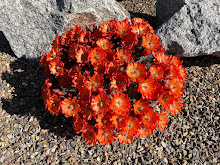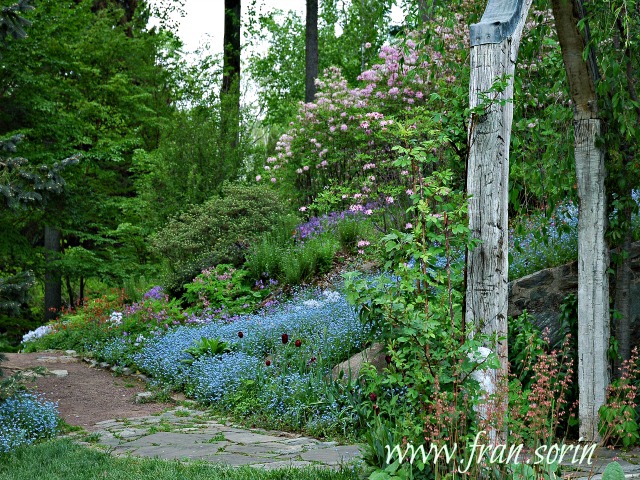We knew we were not going to spend the whole of the two weeks, over Christmas, in Taipei. Mark had made some plans for us to tour around the island for the week of the Christmas holiday, which of course is not a holiday in Taiwan. However, we had no idea where we were going when we set off on the Monday.
We headed away from the bustle of the city and into the hills. This area is known for its persimmon farms and we were visiting at harvest time.
Most of the harvest was picked but there were still a few fruit trees with their fruit protected by paper bags. This was a sight we were to see frequently in other fruit growing areas.
The fruits are carefully sorted and put onto racks ready for drying under the sun's warm rays.
Unfortunately the weather was not cooperative on the day we visited so I could only take a photo of a photo that I saw hanging on the wall. The wicker baskets lead me to believe that this was taken some years ago, although they still dry the persimmons the same way; on racks in the open air.
The racks are in the garden several feet off the ground, with no covering, and the fruit is turned by hand from a ladder which is moved around underneath the racks.
Leaving the area we drove by this cemetery.
and several traditional Taiwanese houses. We were heading to our hotel for the evening.
Mark had arranged for us all to spend the night in a classical Chinese garden hotel in the mountains above the town of Hsinchu. After parking the car we walked on stepping stones through a young bamboo grove entering the reception building through large wooden doors. Here we were greeted with washcloths and tea before we crossed to the main part of the hotel and were taken to our room. It was not hard to see that walking down the hallways to our room, The One, Nan Yuan, was going to be a special treat.
I stopped to photograph this Chinese settee with a tray of herbs and spices.
We were to stay in a house which has been shrouded in mystery for many years. The property was the home of the late Wang Ti-wu, Taipei newspaper magnate, a gift from his sons. It was never lived in as a home but used to entertain dignitaries including Margaret Thatcher and Mikhail Gorbachev. Now after renovations it is a place to go to enjoy meditation, painting, music and their peaceful walled gardens. After refreshing ourselves from the day's travel in our Japanese style bathroom, black slate tiles and oversized tub, we joined the family in their room for a glass of wine before dinner. We had been instructed to be in the dining room by 6pm where there would be some entertainment.
During the early part of our 8 course meal we were entertained by a classical Chinese musician on a seven stringed zither called a Guqin. But I have to share the menu.
First came 'Hakka pancakes with fermented tofu', followed by 'Pork and vegetables salad with dressing by red miso and pineapple sauce'. Next 'Hokkaido scallop and prawn on a bed of salted Hakka herbal jelly and seaweed'. Next a 'soup of clam seaweed with tremella and clam stuffed tomato, decorated with pearl oyster', 'steamed egg mixture of egg, cream, crab meat cuttlefish and Jinxing tofu, topped with clam and green bean'. Plate number six was 'Fried Oyster, accompanied with Cashemir crystal salt, lemon and shredded vegetables'. I chose 'Steamed grouper , seasoned with spices, kumquat-persimmon compote' for my main course. It was served with a 'seasonal vegetable and garlic flavored rice noodle'. The dessert was a small plate of petit fours with my favorite macaroons. Olive tea was served with the meal. Portions were small and elegantly presented so that we did not leave the table feeling we had overeaten. We spent the rest of the evening in the guest lounge area playing Uno.

At breakfast we learn that there is to be a tour of the garden, about which I am very excited. You just have to look through the window to know this is a special garden. Too bad it is raining. We are instructed to head down and meet our guide under the large banyan tree. We pick up large umbrellas out side the door and head down the steps to meet our guide.
The house and gardens were designed by Han Pao teh, and built between 1983 and 1985. In the style of the classical Chinese garden he was given free rein to design as he wished and created a series of wooden structures around a lake with an arched bridge. Bamboo nails were used throughout the building.
Chinese symbols are used throughout, the vase shaped door represents peace because the Chinese words for 'vase' and ''peace are homonyms.

Han used the finest craftsmen.


This pretty flower with its distinctive leaf pattern brightened a corner of one of the enclosed courtyards.

A stone bird rests on a water-worn stone. I am sorry we couldn't see the garden on a sunny day and better explore all it has to offer but the brief visit was one that will remain in my memory for a long time. It is Christmas eve and we must move on to the house where we will spend Christmas day.




















































































